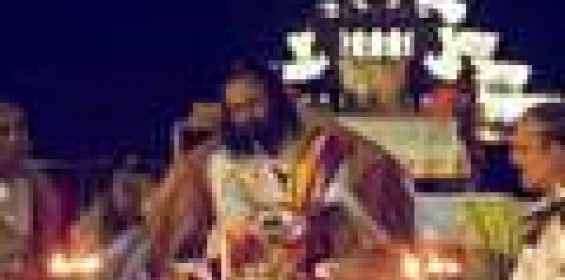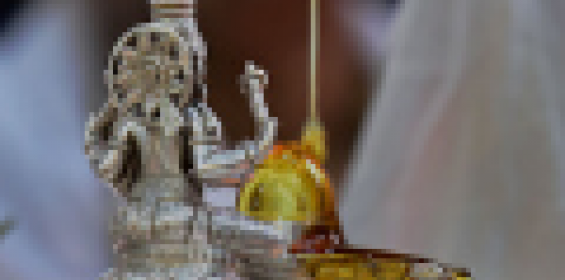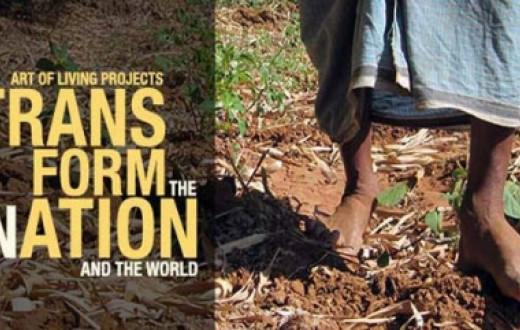Shiv Tandav Stotram Lyrics, Benefits & Meaning
Shiv Tandav Stotram by Ravana
Jatakatahasambhrama bhramanilimpanirjhari
Vilolavichivalara ivirajamanamurdhani
Dhaga dhaga dhaga lalalatapattapavake
Kishore chandra shekhare
Ratih pratik shanam mama
Salutations to Lord Shiva, whose hair is like a dense forest, whose throat is wet by the pure, flowing water of the Ganga; the snakes resting around the neck of Shiva are like long garlands; Damad-damad-damad - is the sound of drums that describes the passionate dance of the fearless Lord Shiva.
What an amazing description of Lord Shiva! Such descriptions are usually written by those who are steeped in love or devotion. Have you wondered who the composer of this beautiful Shiva Tandava Stotram is? It was King Ravana!
He was one of the most ardent devotees of Lord Shiva. Shiva Tandava Stotram was written by Ravana centuries ago. Ravana was infamous in the great Indian epic Ramayana for abducting Sita, wife of Lord Rama. Most know the arrogant, egoistic side of Ravana, but only a few know about his devotion to Lord Shiva. Here, we take a deeper look at Ravana, who was a great devotee and an artist.

Who Wrote Shiv Tandava Stotram Lyrics?
Shiv Tandava Stotram is a hymn written and sung by Ravana in praise of Lord Shiva. The Shiv Tandav Stotram represents the cosmic dance of Lord Shiva that eliminates all negative energies. The hymn includes 15 verses and each verse describes the fearless Shiva and his eternal beauty in great detail.
Why did Ravana write Shiv Tandav Stotram?
In India, every dominant divine energy has many forms and names. Among the many virtues of Lord Shiva, the most popular one is where Shiva is addressed as Bholenath; it means one who is innocent and easy to please.
The legend goes like this: Lord Shiva granted a boon to anyone who praised him, or performed penance with faith and devotion. All the demons took undue advantage of this and worshiped Lord Shiva as they knew that it was easy to please him and then receive a boon.
Ravana, who was a great priest, administrator, warrior, and devotee of Lord Shiva was known as the demon of demons. He loved himself and his powers a lot.
The story of Shiv Tandav Stotram begins on a day when Ravana tried to lift the Kailash mountain in his hand to take Lord Shiva along with him to Sri Lanka. As a consequence, Lord Shiva pressed his toe, and in the process, crushed the fingers of Ravana. Ravana cried in pain. To escape from the wrath of Lord Shiva, Ravana sang a hymn which came to be known as the popular Shiva Tandav Stotram.
It is said that music is the most powerful tool to please the Lord. Lord Shiva was engrossed in the music of Ravana and became immensely pleased. When Lord Shiva told Ravana to ask for a boon, Ravana requested that the Lord confer him with the most powerful tool and thus, became indestructible.
Whatare benefits of Shiv Tandav Stotram?
There are innumerable benefits of Shiv Tandav Stotram. Chanting or listening to Shiva Tandava Stotram confers one with immense power, beauty, and mental strength. It is said that chanting the stotram removes all negative energies and makes the atmosphere pious.
When should we chant Shiv Tandav Stotram and how can this benefit us?
Shiva Tandava Stotram has no specific time and anyone can chant it at any time. However, there are some special benefits of chanting it at these times:
1) During an eclipse: It is said that when you chant Om Namah Shivaya or Shiva Tandava Stotram during the time of an eclipse, it reduces all the ill effects of planets. During the eclipse, chanting, meditating, or praying is a hundred times more effective than at other times.
2) During dawn and dusk: It is said that whatever activity you do during Brahma Muhurta, its impact is manifold more. It reduces the amount of energy consumed and doubles the productivity. During dusk, lamps are lit in every house and prayers are offered in many households. Some even conduct satsangs to soak in the positive vibrations.
3) Pradosh Vrat: Pradosh Kaal is the time of the month that falls on the 13th day and is also known as Trayodashi tithi. This tithi falls fortnightly. It is said that chanting Shiva Tandava Stotram on every Trayodashi tithi helps burn sins. Note that Pradosh Kaal varies according to different locations.
How to learn Shiv Tandav Stotram
It is important to chant this mantra in the right way. These days, many just recite the mantra in a hurry without understanding the meaning and the correct pronunciation.
To learn Shiv Tandav Stotram, you must first listen to it 5-6 times to understand the meaning and pronunciation. After listening, keep practicing and playing the stotram simultaneously. It is recommended to learn the stotram while singing, as it will help you remember it quickly.
Shiv Tandav Stotram Video
Shiv Tandav Stotram Lyrics in Sanskrit and English with meaning
जटाटवीगलज्जलप्रवाहपावितस्थले
गलेऽवलम्ब्य लम्बितां भुजङ्गतुङ्गमालिकाम् ।
डमड्डमड्डमड्डमन्निनादवड्डमर्वयं
चकार चण्डताण्डवं तनोतु नः शिवः शिवम् ॥१॥
Jatatavigalajjala pravahapavitasthale
Galeavalambya lambitam bhujangatungamalikam |
Damad damad damaddama ninadavadamarvayam
Chakara chandtandavam tanotu nah shivah shivam ||1||
From Lord Shiva’s matted hair flows the holy river, Ganga consecrating His neck,
From His neck hangs the serpent like a garland,
From His damaru (percussion instrument) comes the damad-damad-damad sound filling the air,
Lord Shiva performs His passionate Tandava dance; may the Lord bless us all!
जटाकटाहसम्भ्रमभ्रमन्निलिम्पनिर्झरी_
विलोलवीचिवल्लरीविराजमानमूर्धनि ।
धगद्धगद्धगज्जलल्ललाटपट्टपावके
किशोरचन्द्रशेखरे रतिः प्रतिक्षणं मम ॥२॥
Jata kata hasambhrama bhramanilimpanirjhari
Vilolavichivalarai virajamanamurdhani |
Dhagadhagadhagajjva lalalata pattapavake
Kishora chandrashekhare ratih pratikshanam mama ||2||
As the rows of waves of the sacred Ganga move through Lord Shiva’s matted hair, it glorifies His Head,
The waves of the river flow into the depths of His locks of hair,
A brilliant fire burns on the surface of Lord Shiva’s forehead,
And the crescent moon is a jewel on His Head.
(May we find constant joy in Him!)
धराधरेन्द्रनन्दिनीविलासबन्धुबन्धुर
स्फुरद्दिगन्तसन्ततिप्रमोदमानमानसे ।
कृपाकटाक्षधोरणीनिरुद्धदुर्धरापदि
क्वचिद्दिगम्बरे मनो विनोदमेतु वस्तुनि ॥३॥
Dharadharendrana ndinivilasabandhubandhura
Sphuradigantasantati pramodamanamanase |
Krupakatakshadhorani nirudhadurdharapadi
Kvachidigambare manovinodametuvastuni ||3||
Salutations to Lord Shiva, who is the sporting consort of the daughter of the mountain king (Parvati),
In whose mind the universe with all the living beings exist,
Whose all-pervading, compassionate glance removes all hardships,
Who wears the directions as His apparel.
(May my mind find bliss in Him!)
जटाभुजङ्गपिङ्गलस्फुरत्फणामणिप्रभा
कदम्बकुङ्कुमद्रवप्रलिप्तदिग्वधूमुखे ।
मदान्धसिन्धुरस्फुरत्त्वगुत्तरीयमेदुरे
मनो विनोदमद्भुतं बिभर्तु भूतभर्तरि ॥४॥
Jata bhujan gapingala sphuratphanamaniprabha
Kadambakunkuma dravapralipta digvadhumukhe |
Madandha sindhu rasphuratvagutariyamedure
Mano vinodamadbhutam bibhartu bhutabhartari ||4||
Salutations to Lord Shiva, who shines radiantly because of the luster of the gem on the reddish-brown hood of the creeping serpent,
Kadambha juice-like red vermilion (kumkum) is smeared on the faces of the Goddesses of direction,
Who wears a cloak made of elephant hide,
May I find pleasure in that Lord of Bhoota! (ghosts - meaning the mystical beings guarding Kailasa)
सहस्रलोचनप्रभृत्यशेषलेखशेखर_
प्रसूनधूलिधोरणी विधूसराङ्घ्रिपीठभूः ।
भुजङ्गराजमालया निबद्धजाटजूटकः
श्रियै चिराय जायतां चकोरबन्धुशेखरः ॥५॥
Sahasra lochana prabhritya sheshalekhashekhara
Prasuna dhulidhorani vidhusaranghripithabhuh |
Bhujangaraja malaya nibaddhajatajutaka
Shriyai chiraya jayatam chakora bandhushekharah ||5||
Salutations to Lord Shiva, whose footrest is decorated by the dust from flowers,
Which fall from the heads of all the gods - Indra, Vishnu and others,
Whose matted locks are bound by the snake-garland,
Whose head holds the moon, a friend of Chakora (a mythical bird that drinks moonlight), as a crown.
(May Lord Shiva bless us with prosperity!)
ललाटचत्वरज्वलद्धनञ्जयस्फुलिङ्गभा_
निपीतपञ्चसायकं नमन्निलिम्पनायकम् ।
सुधामयूखलेखया विराजमानशेखरं
महाकपालिसम्पदेशिरोजटालमस्तु नः ॥६॥
Lalata chatvarajvaladhanajnjayasphulingabha
Nipitapajnchasayakam namannilimpanayakam |
Sudha mayukha lekhaya virajamanashekharam
Maha kapali sampade shirojatalamastu nah ||6||
May Lord Shiva, who devoured the God of Love with the fire burning on His forehead,
Who is revered by the celestial leaders,
Whose forehead is enticing with the gleam and cool rays of the crescent moon,
Shower His blessings on us, so we obtain the wealth of the Siddhis.
करालभालपट्टिकाधगद्धगद्धगज्ज्वलद्_
धनञ्जयाहुतीकृतप्रचण्डपञ्चसायके ।
धराधरेन्द्रनन्दिनीकुचाग्रचित्रपत्रक
प्रकल्पनैकशिल्पिनि त्रिलोचने रतिर्मम ॥७॥
Karala bhala pattikadhagaddhagaddhagajjvala
Ddhanajnjaya hutikruta prachandapajnchasayake |
Dharadharendra nandini kuchagrachitrapatraka
Prakalpanaikashilpini trilochane ratirmama ||7||
Salutations to Lord Shiva, whose forehead burns with a dhagad-dhagad sound,
Who offered the five arrows (of the God of Love) to the fire,
Who is the only artist capable of tracing decorative lines on the tips of the breasts of Parvati, the daughter of the mountain king.
(May we repose in him!)
नवीनमेघमण्डली निरुद्धदुर्धरस्फुरत्_
कुहूनिशीथिनीतमः प्रबन्धबद्धकन्धरः ।
निलिम्पनिर्झरीधरस्तनोतु कृत्तिसिन्धुरः
कलानिधानबन्धुरः श्रियं जगद्धुरंधरः ॥८॥
Navina megha mandali niruddhadurdharasphurat
Kuhu nishithinitamah prabandhabaddhakandharah |
Nilimpanirjhari dharastanotu krutti sindhurah
Kalanidhanabandhurah shriyam jagaddhurandharah ||8||
Salutations to Lord Shiva, whose neck is as dark as layers of dark clouds on the night of the full moon,
Who is enchanting as He wears the moon and celestial river on His head,
Who bears the weight of this universe.
(May He bless us with prosperity!)
प्रफुल्लनीलपङ्कजप्रपञ्चकालिमप्रभा_
वलम्बिकण्ठकन्दलीरुचिप्रबद्धकन्धरम् ।
स्मरच्छिदं पुरच्छिदं भवच्छिदं मखच्छिदं
गजच्छिदान्धकच्छिदं तमन्तकच्छिदं भजे ॥९॥
Praphulla nila pankaja prapajnchakalimchatha
Vdambi kanthakandali raruchi prabaddhakandharam |
Smarachchidam purachchhidam bhavachchidam makhachchidam
Gajachchidandhakachidam tamamtakachchidam bhaje ||9||
Salutations to Lord Shiva, whose neck shines with the brightness of fully-bloomed blue lotus flowers (that temples use),
Which look like the blackness of the universe,
Who destroyed Manmatha (God of Love), Tripura (3 cities),
Who destroyed the bonds of worldly life, and the yagnas (sacrifices),
Who destroyed Andhaka (his blind son), who destroyed the elephant demon (Gajasura), and the God of Death (Yama).
(May He bless us with prosperity!)
अखर्वसर्वमङ्गलाकलाकदम्बमञ्जरी_
रसप्रवाहमाधुरीविजृम्भणामधुव्रतम् ।
स्मरान्तकं पुरान्तकं भवान्तकं मखान्तकं
गजान्तकान्धकान्तकं तमन्तकान्तकं भजे ॥१०॥
Akharvagarvasarvamangala kalakadambamajnjari
Rasapravaha madhuri vijrumbhana madhuvratam |
Smarantakam purantakam bhavantakam makhantakam
Gajantakandhakantakam tamantakantakam bhaje ||10||
Salutations to Lord Shiva, who has bees flying around Him,
Because of the auspicious and sweet scent of the kadambha flowers,
Who destroyed Manmatha (God of Love), Tripura (3 cities),
Who destroyed the bonds of worldly life, and the yagnas (sacrifices),
Who destroyed Andhaka (his blind son), the elephant demon (Gajasura), and the God of Death (Yama).
(May He bless us with prosperity!)
जयत्वदभ्रविभ्रमभ्रमद्भुजङ्गमश्वसद्_
विनिर्गमत्क्रमस्फुरत्करालभालहव्यवाट् ।
धिमिद्धिमिद्धिमिध्वनन्मृदङ्गतुङ्गमङ्गल_
ध्वनिक्रमप्रवर्तितप्रचण्डताण्डवः शिवः ॥११॥
Jayatvadabhravibhrama bhramadbhujangamasafur
Dhigdhigdhi nirgamatkarala bhaal havyavat |
Dhimiddhimiddhimidhva nanmrudangatungamangala
Dhvanikramapravartita prachanda tandavah shivah ||11||
Salutations to Lord Shiva, who has a fire on His forehead, that is ever-increasing
Because of the breath of the snake wandering in the sky,
Whose Tandava dance is in tune with dhimid-dhimid,
Victory to Lord Shiva!
दृषद्विचित्रतल्पयोर्भुजङ्गमौक्तिकस्रजोर्_
गरिष्ठरत्नलोष्ठयोः सुहृद्विपक्षपक्षयोः ।
तृणारविन्दचक्षुषोः प्रजामहीमहेन्द्रयोः
समप्रवृत्तिकः कदा सदाशिवं भजाम्यहम् ॥१२॥
Drushadvichitratalpayor bhujanga mauktikasrajor
Garishtharatnaloshthayoh suhrudvipakshapakshayoh |
Trushnaravindachakshushoh prajamahimahendrayoh
Sama pravartayanmanah kada sadashivam bhajamyaham ||12||
Towards different forms of the world, towards a snake and a garland,
Towards the most precious gem as well as a lump of dirt, and friends and enemies,
Towards a blade of grass or a lotus, towards common people or emperors,
Lord Shiva has an equanimous vision - where can I worship Lord Sadashiva?
कदा निलिम्पनिर्झरीनिकुञ्जकोटरे वसन्
विमुक्तदुर्मतिः सदा शिरःस्थमञ्जलिं वहन् ।
विमुक्तलोललोचनो ललामभाललग्नकः
शिवेति मन्त्रमुच्चरन्कदा सुखी भवाम्यहम् ॥१३॥
Kada nilimpanirjhari nikujnjakotare vasanh
Vimuktadurmatih sada shirah sthamajnjalim vahanh |
Vimuktalolalochano lalamabhalalagnakah
Shiveti mantramuchcharan sada sukhi bhavamyaham ||13||
When can I be happy, living in a cave near the celestial river Ganga,
Clasping my hands together on my head all the time,
Devoted to the Lord with a glorious forehead and with vibrant eyes,
Washing away my impure thoughts with the mantra of Shiva?
इमं हि नित्यमेवमुक्तमुत्तमोत्तमं स्तवं
पठन्स्मरन्ब्रुवन्नरो विशुद्धिमेतिसंततम् ।
हरे गुरौ सुभक्तिमाशु याति नान्यथा गतिं
विमोहनं हि देहिनां सुशङ्करस्य चिन्तनम् ॥१४॥
Imam hi nityameva muktamuttamottamam stavam
Pathansmaran bruvannaro vishuddhimeti santatam |
Hare gurau subhaktimashu yati nanyatha gatim
Vimohanam hi dehinam sushankarasya chintanam ||14||
Anyone who reads, remembers, and recites this stotram
Is purified forever and immerses in deep devotion to the great Guru Shiva leading to salvation.
There is no other way or refuge,
Just the mere thought of Lord Shiva removes the delusion and detachment.
पूजावसानसमये दशवक्त्रगीतं यः
शम्भुपूजनपरं पठति प्रदोषे ।
तस्य स्थिरां रथगजेन्द्रतुरङ्गयुक्तां
लक्ष्मीं सदैव सुमुखीं प्रददाति शम्भुः ॥१५॥
Puja vasanasamaye dashavaktragitam
Yah shambhupujanaparam pathati pradoshhe |
Tasya sthiram rathagajendraturangayuktam
Lakshmim sadaiva sumukhim pradadati shambhuh ||15||
One who recites this song composed by Ravana
At the end of prayer to Lord Shiva early in the morning,
Gets wealth of chariots, elephants, horses.
Lord Shambhu always gives such people prosperity.
Om Namah Shivay!!
(Salutations to Lord Shiva!)
To learn and listen to Shiv Tandav Stotram, visit here or download The Art of Living app from the play store on your phone
Based on knowledge talks by Gurudev Sri Sri Ravi Shankar.
We’d love to hear from you. Leave your comments @artofliving.























































































